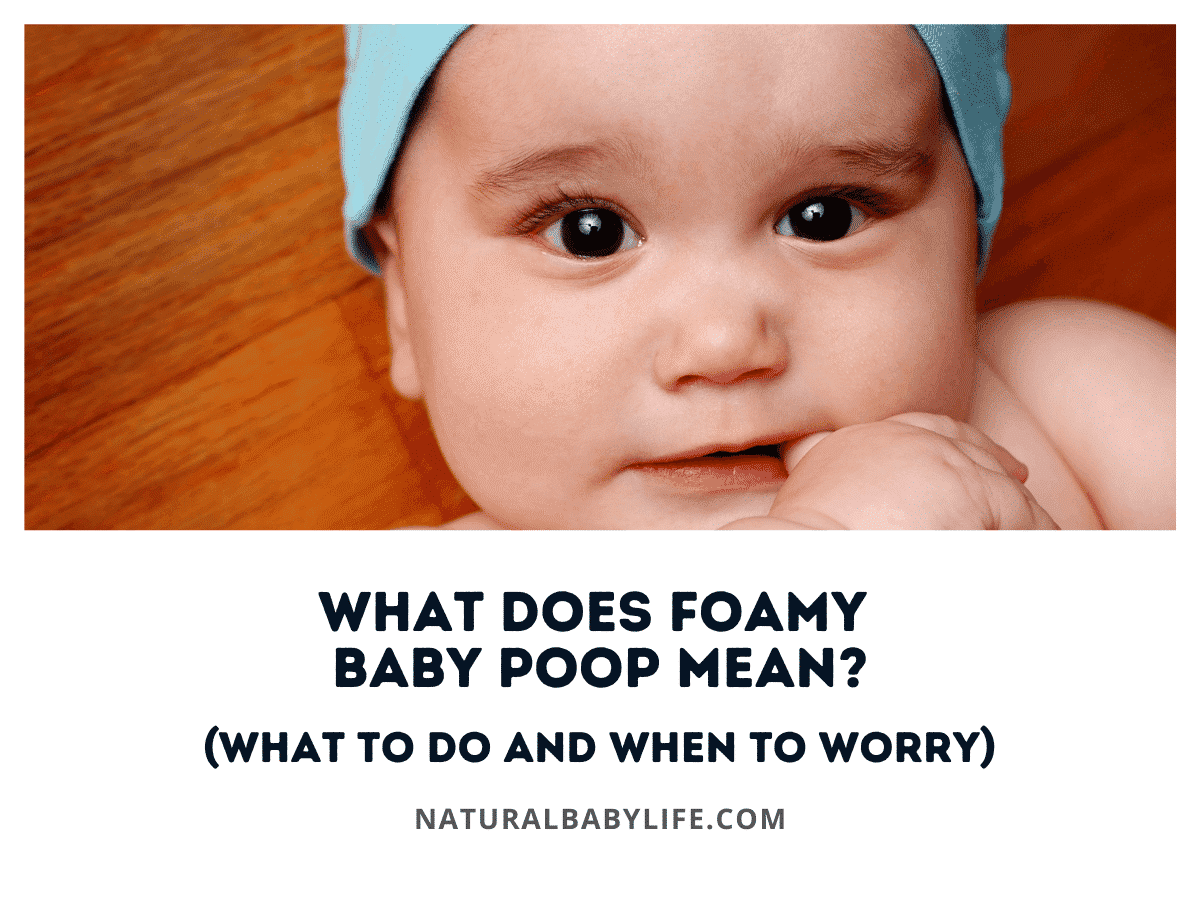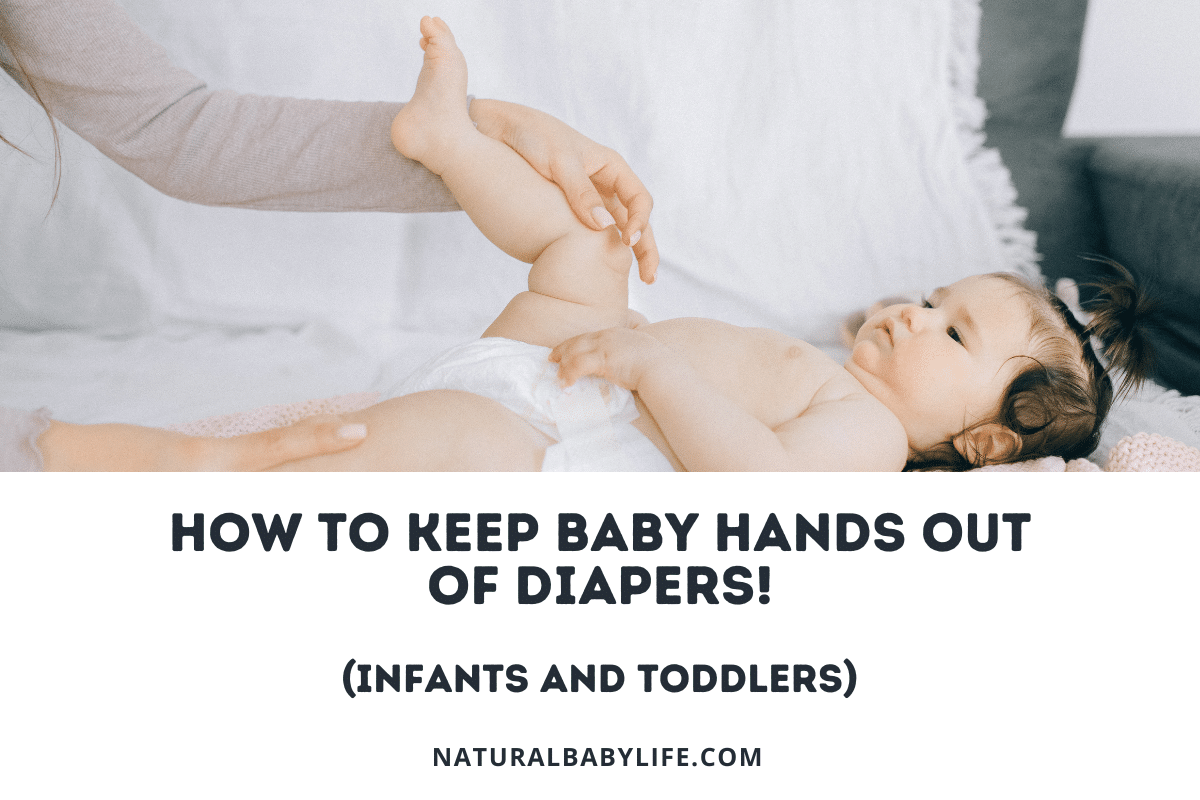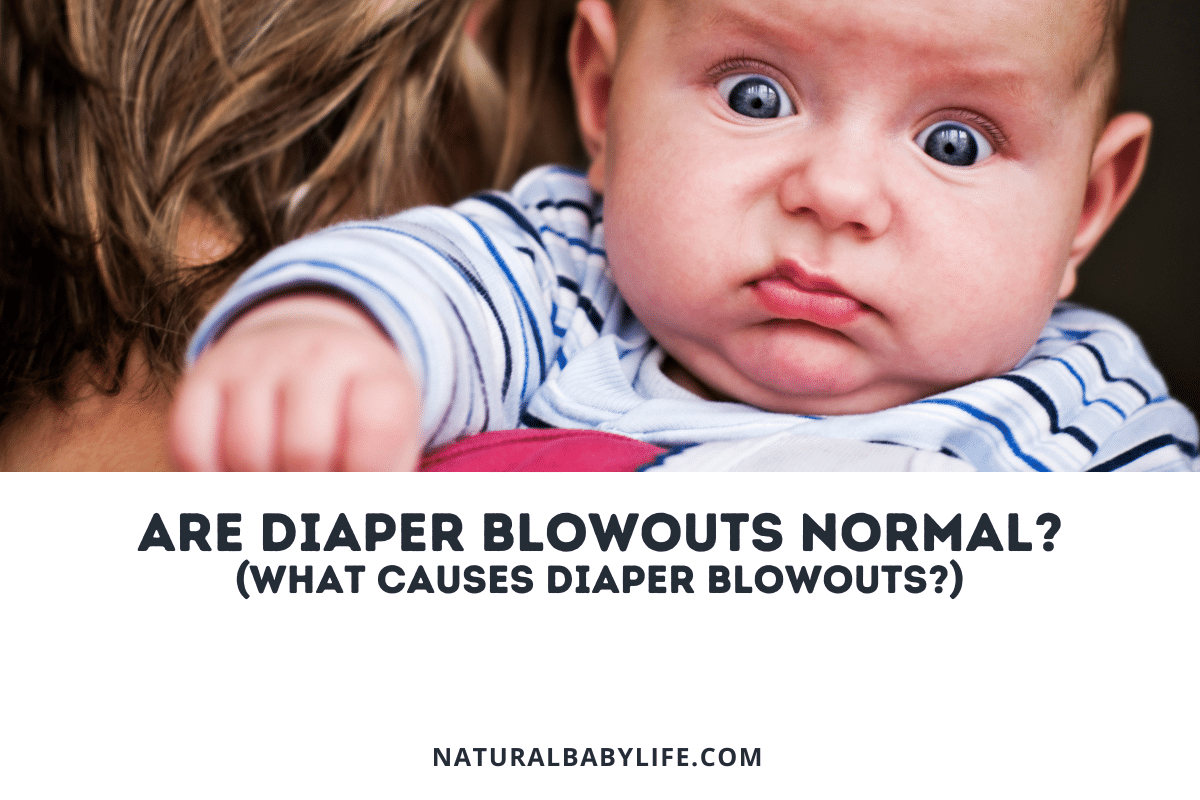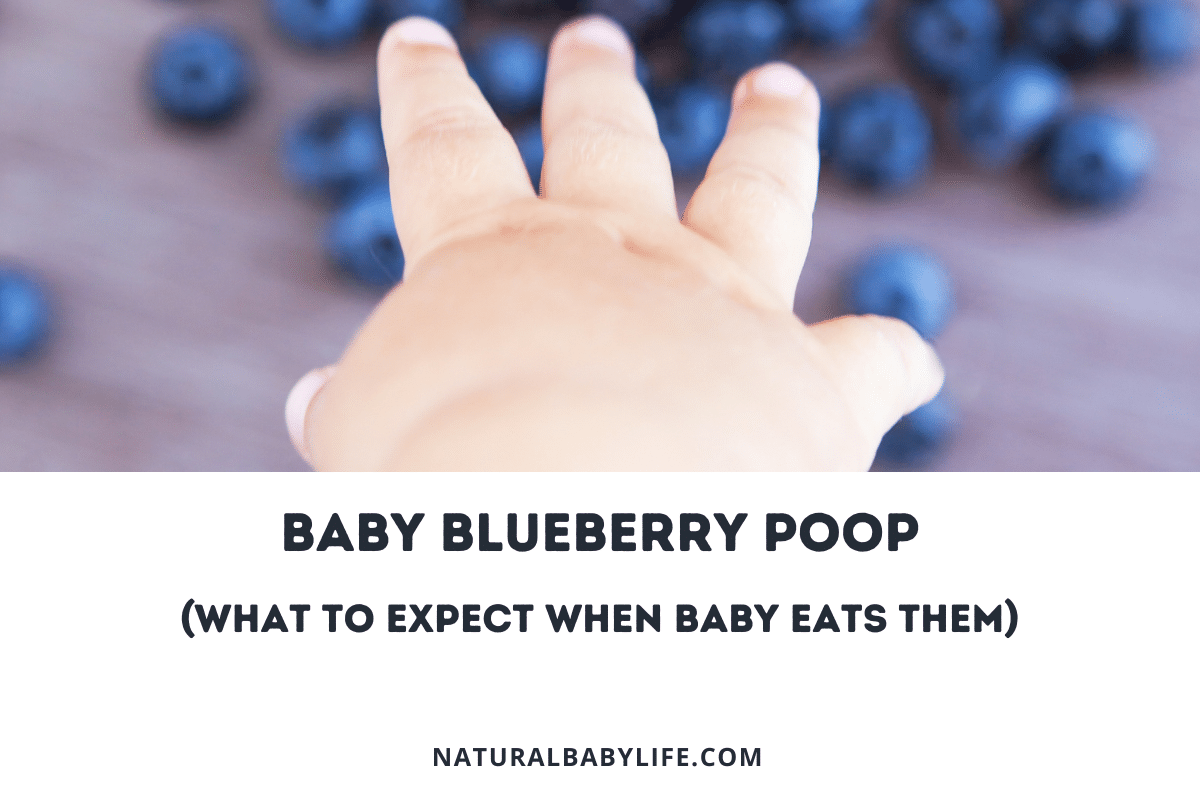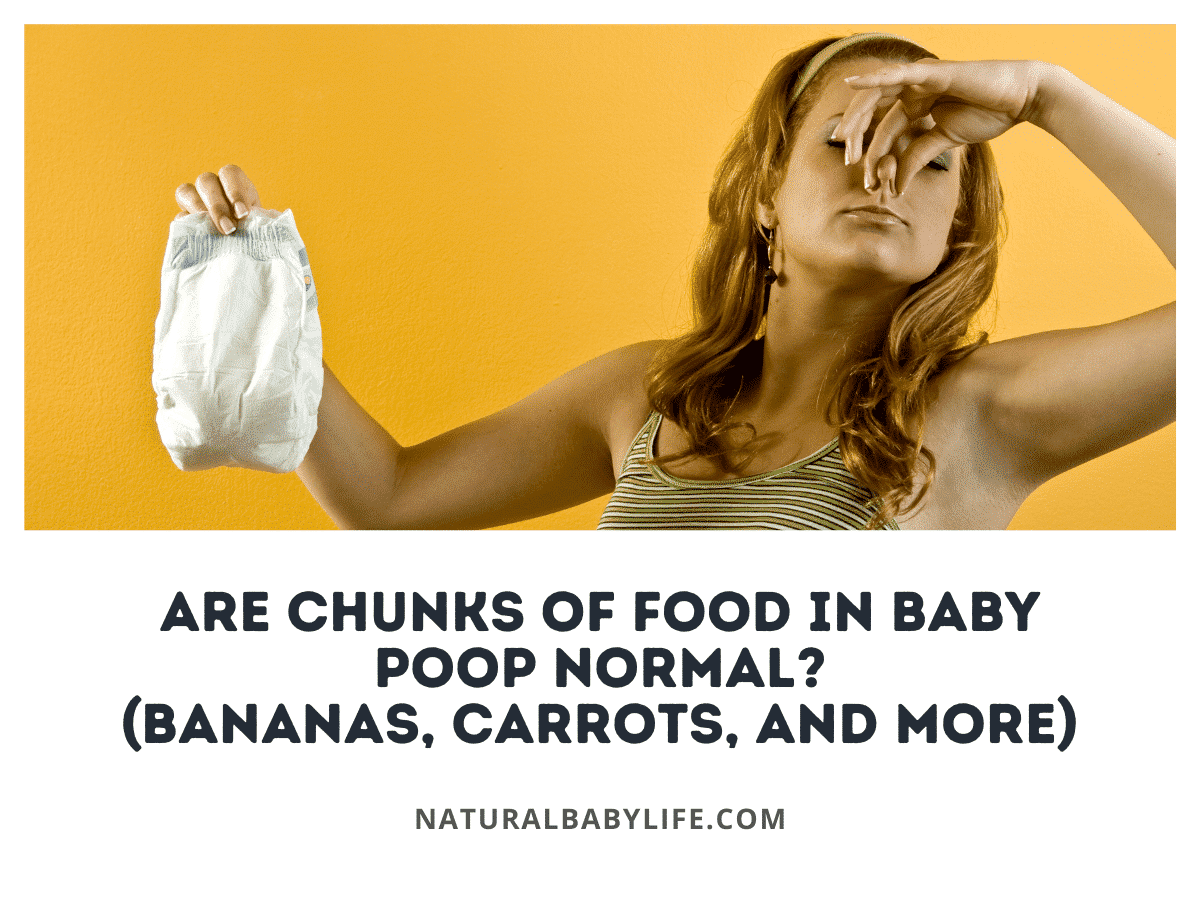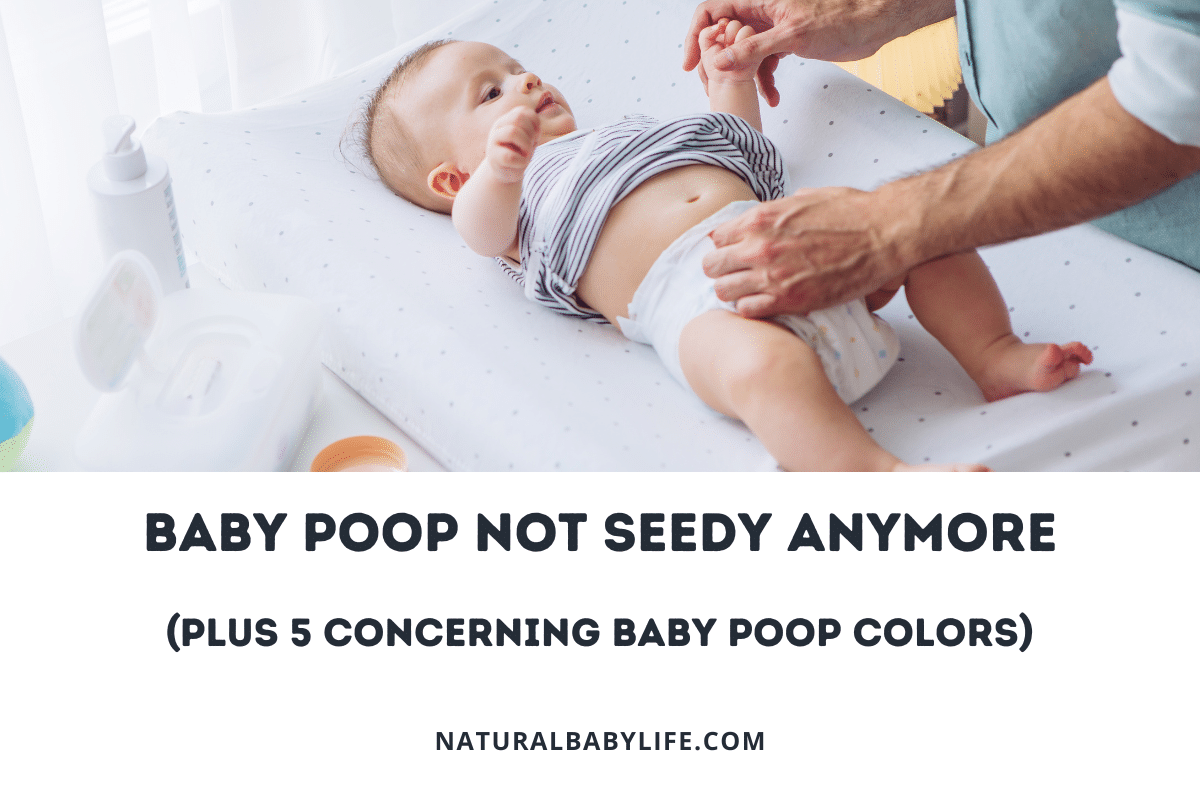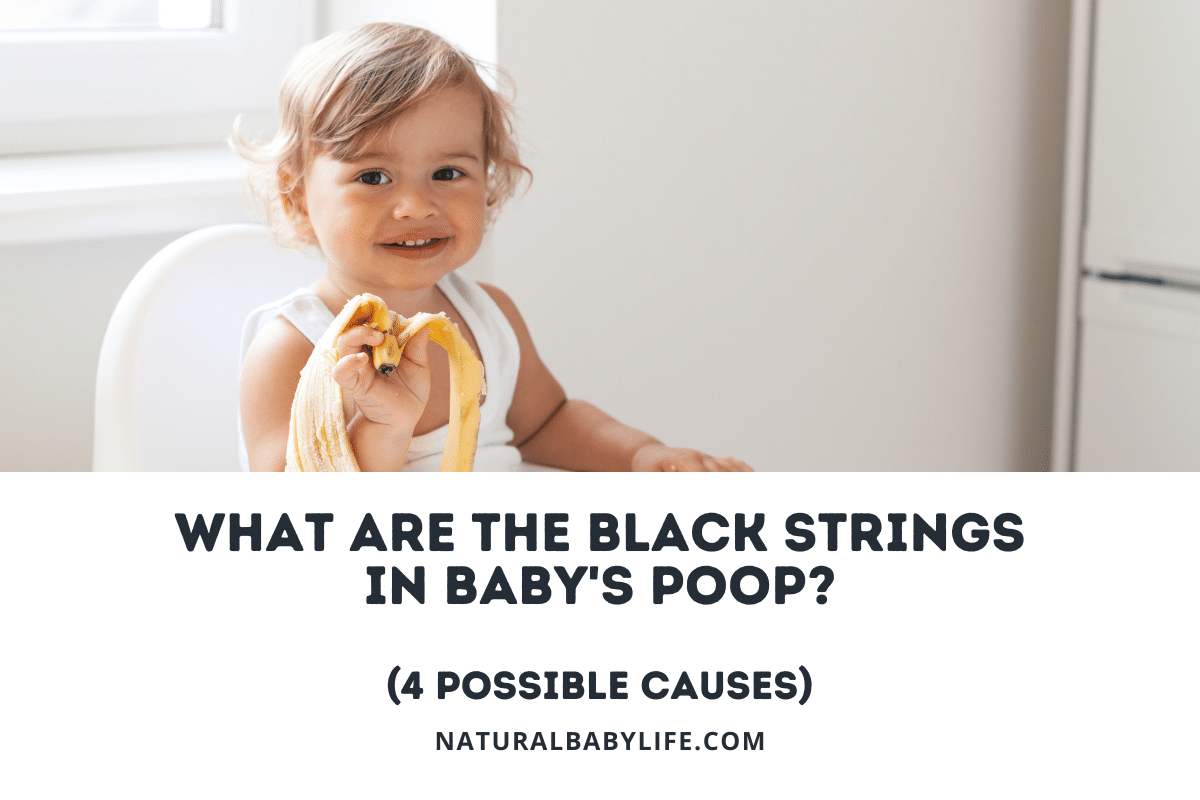It’s time to change the baby’s poopy diaper. On opening, it appears to be foamy. Is this something to be worried about?
Foamy or frothy poop is surprisingly common in babies and is generally not a cause for concern. The most common causes of foamy poop are that your baby is getting an imbalance of foremilk to hindmilk or they are teething. If your baby’s poop changes suddenly and is accompanied by other symptoms, you may need to contact your pediatrician.
Keep reading to see what causes foamy poop, how to stop it, and when to worry.
Table of Contents
What is foamy baby poop?
Foamy poop is very common in babies and is usually not a cause for concern. When a baby has foamy poop, it can look frothy, bubbly, and is runny.
The color can range from yellow to green, depending on the cause and the baby’s diet.
For example, breastfed poop is yellow and can be runny with bubbles. Formula poop can range from yellow to light brown and can be chunky and firm.
Baby poop will most likely not become more solid until foods are introduced unless they are constipated.
If your baby’s poop changes and the foam is not normal, it is something to watch, especially if there are other things going on or if the baby seems uncomfortable. If you’re not sure whether your baby’s poop is foamy, check the web for frothy baby poop pictures. Just don’t do it while eating.
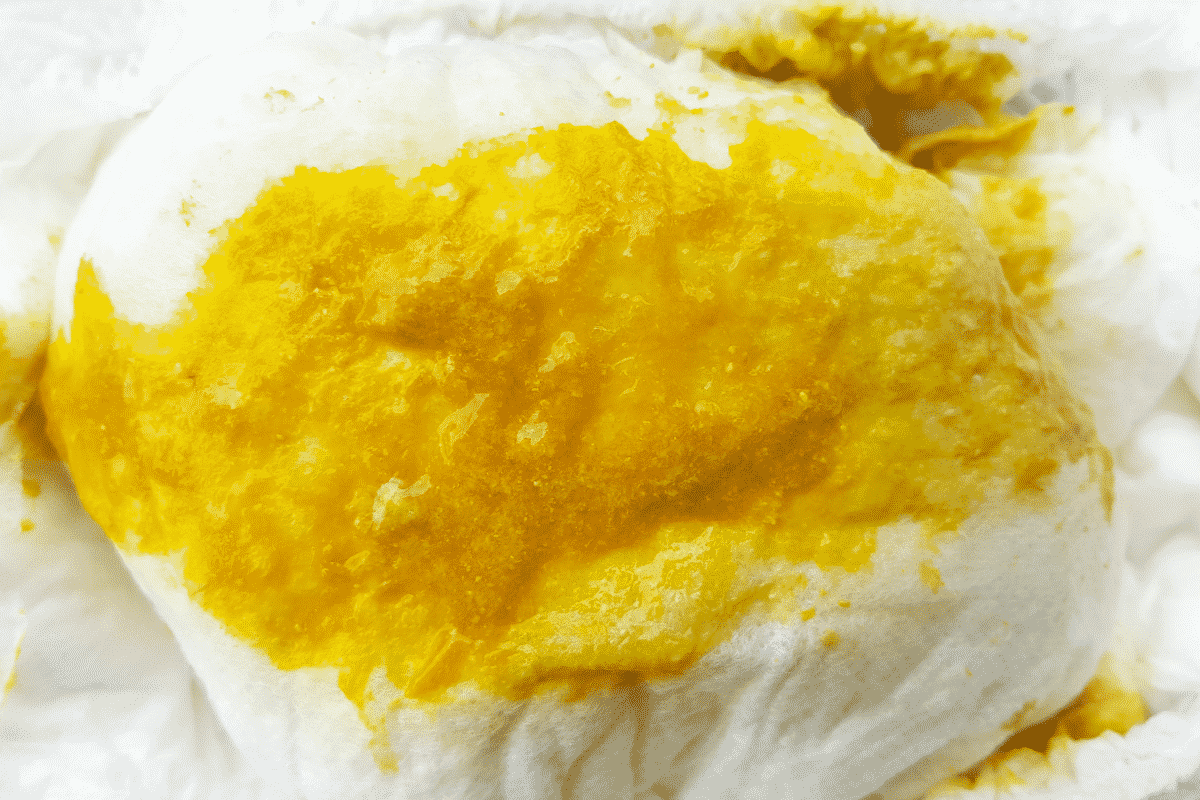
Is foamy poop a sign of sickness or infection?
If a baby has frothy poop that is not normal, it could be a sign of sickness or infection such as Giardia or bacterial gastroenteritis.
These bacterial infections can cause a lot of problems and discomfort and can happen when the baby ingests contaminated food or liquids.
Other symptoms of an infection include:
- Fatigue
- Gas
- Nausea
- Stomach cramps (Babies can’t tell us if it hurts, but your baby may cry if her tummy is lightly pressed)
- Unexplained weight loss
Other types of sickness that could lead to foamy poop:
- A stomach virus is a common one that causes diarrhea, which can be foamy. Other symptoms include fever and vomiting.
- Rotavirus is usually prevented by a vaccine that your baby should receive. However, the side effects of the vaccine can include fever and diarrhea.
- Chronic Diarrhea is not as common but can cause foamy poop, as well as malabsorption and dehydration.
- Pancreatitis is most often caused by genetic disorders in children. Other symptoms will include a swollen abdomen and vomiting.
All of these are causes for concern that should be told to your pediatrician as soon as possible for treatment! Not all cases are serious, but it is better to be safe than sorry. You should especially contact if the poop is accompanied by fever and/or vomiting.
What causes foamy poop?
While there are many causes for foamy poop, the most common answers come from the baby’s diet and can be altered with advice from the pediatrician.
What causes foamy poop in breastfed babies?
Breastfed babies may have foamy poop as a result of an imbalance in their foremilk/hindmilk consumption, they are teething, or they might have food or lactose insensitivity.

Too much foremilk/not enough hindmilk
If you have an oversupply of breastmilk, you would have a lot of foremilk, especially if you offer both breasts to the baby at once. Foremilk is the milk obtained at the beginning of breastfeeding. It is high in lactose (milk sugar) and lower in calories and does not contain a lot of fat. Looking at it, the foremilk would be thin, watery, and even have a bluish tint.
If the baby primarily drinks foremilk and does not get enough hindmilk, they will not get full and want to nurse more often. It can also cause stomach and gastrointestinal (GI) issues.
Symptoms of a breastmilk imbalance include:
- Loose, green bowel movements that can be frothy
- Gas
- Abdominal pain
- Irritability
- Crying
You want your baby to be able to get to the nutritious hindmilk after. Hindmilk is the milk obtained after the foremilk has gone through in the same breastfeeding session and contains more fat.
What can I do?
If you think that your baby isn’t getting enough hindmilk, there are several easy ways to fix the problem and encourage your baby to get a better balance of sweet foremilk and nutritious hindmilk.
Here are three quick tips:
- Pump – You can pump or hand express some of the foremilk so the baby can get to the hindmilk easier. It also softens the breasts and keeps the milk from coming out too fast, which prevents breast engorgement (hard milk-filled breasts) and fast flow.
- Nurse one side at a time – For each feeding, focus on one breast at a time. This will ensure that the baby gets both foremilk and hindmilk, as well as draining the breasts fully.
- Don’t limit feedings – Let your baby stay on one side as long as they want until they are full. Don’t worry about time limits. If they get fussy, put them back on the same breast so they can get the hindmilk right away.
Teething
Teething is definitely a cause of foamy baby poop because they are drooling a lot and swallowing it. It starts to happen around 4 to 7 months.
Symptoms of teething:
- Foamy poop/diarrhea
- Fussing
- Crying
- Excessive drooling
- Chewing on toys, hands, or even you
- Low-grade fever
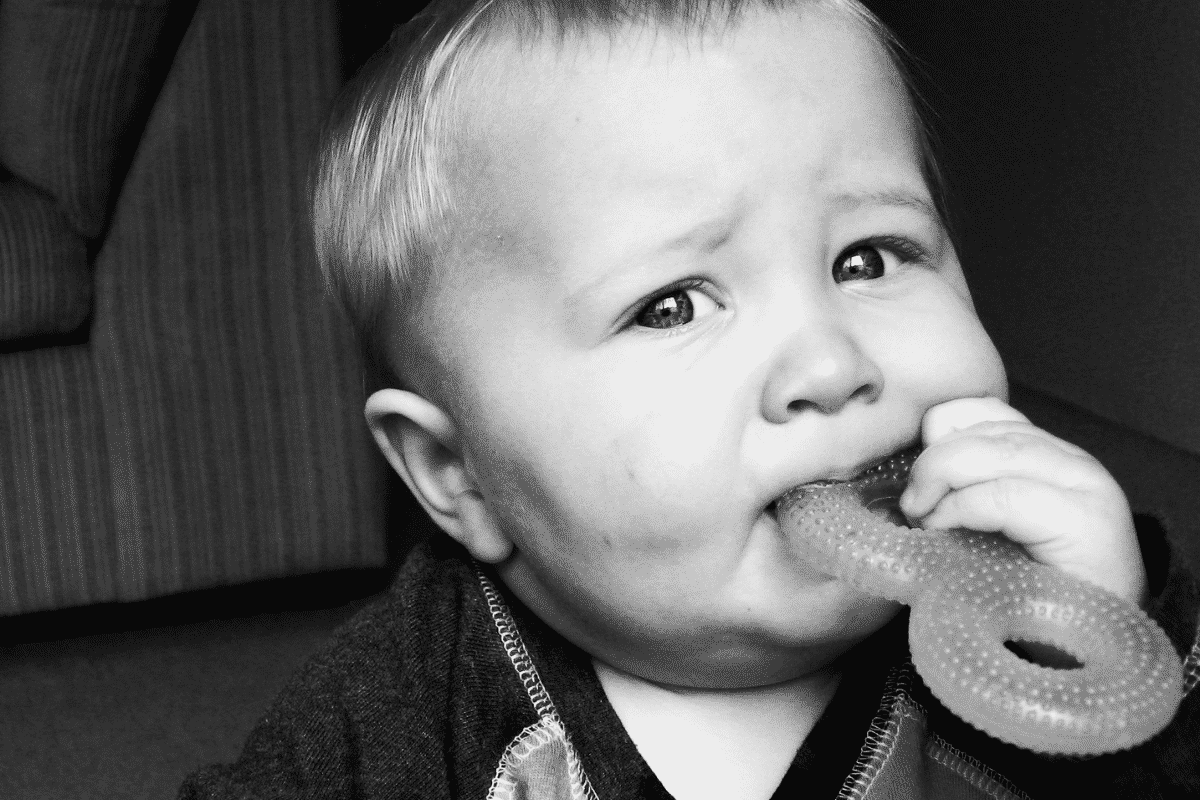
What can I do?
Breastfeeding with a teething baby can be hard and painful for both of you. You may even be tempted to start weaning, but there are remedies that will help the baby and you.
- Give them something cold or frozen to chew on before and after nursing such as a washcloth or teething toy to relieve the sore gums.
- Massage their gums with a clean finger before starting the nursing session.
- Change positions if you feel any soreness or discomfort.
- Give your baby children’s Tylenol or Motrin half an hour before nursing.
- Don’t force it if your baby doesn’t want to nurse. Keep pumping to keep your supply up. If they want the milk, give it in a cup or bottle
- Don’t use numbing remedies! These can affect their mouth and how they nurse.
Food or dairy sensitivity
This seems to happen a lot and has to do mainly with the mother’s diet. The main culprits are dairy, eggs, and other common allergies.
Symptoms of a food or dairy sensitivity:
- Diarrhea including frothy, smelly poops
- Pain
- Vomiting
- Reflux causes a lot of spit-ups and can affect a baby’s weight gain
- Colic
- Rash or hives can be a sign of a more severe allergy
- Blood in the poop
Dairy sensitivity is unusual in babies but can happen. Lactose intolerance is different from a milk allergy. Lactose is the sugar in milk, while the allergy has to do with protein.
What can I do?
If your baby is displaying food or dairy sensitivity to food being passed through the mother’s diet, you don’t need to stop breastfeeding, but you do need to figure out what you need to cut out of your diet.
Keep a food journal and pay attention to what specific foods might trigger the baby. Start by cutting them out, then reintroduce them in a couple of weeks to see what happens. Generally, your baby will outgrow a food sensitivity within a year.
Check with your doctor, either way, to screen or allergies or sensitivities that concern you, especially if there is a family history of them.
What causes foamy poop in formula-fed babies?
Many of the causes of foamy poop in formula-fed babies are the same as in breastfed babies (although mom’s diet isn’t a problem here!), but you do have to watch for any lactose sensitivities that may be aggravated by their formula.
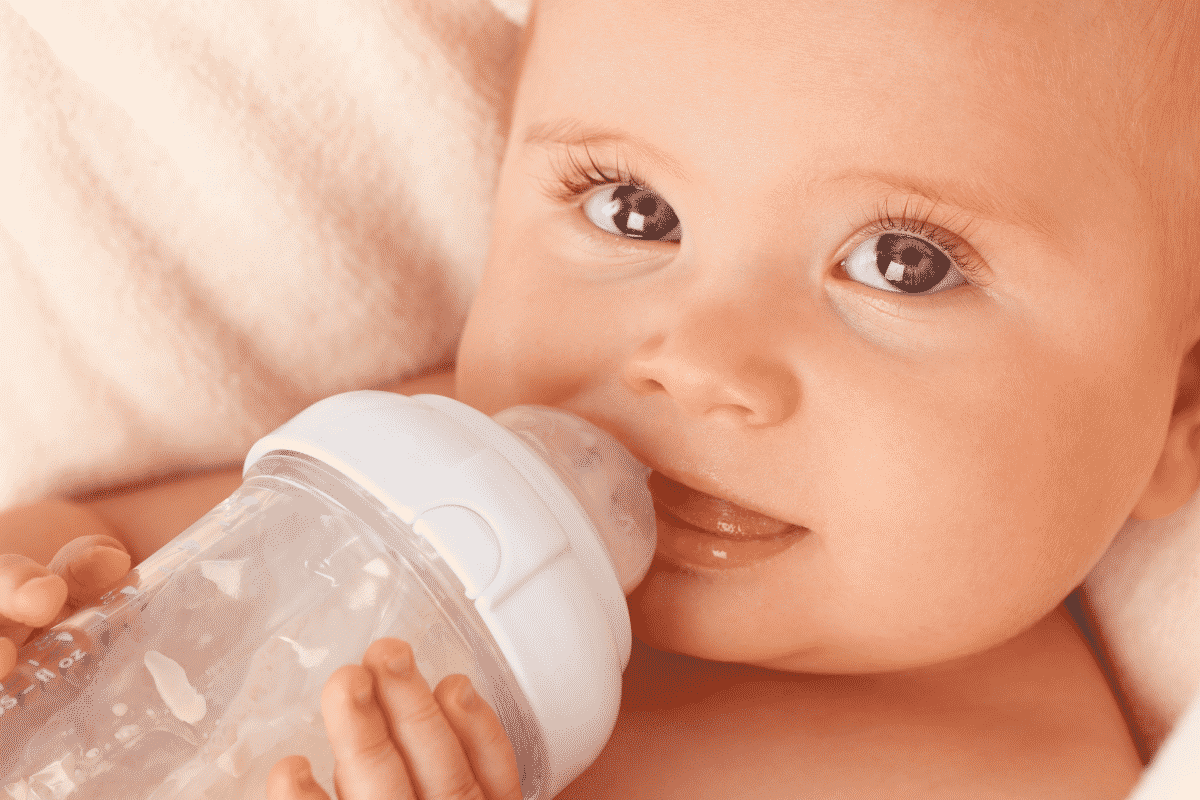
Teething
Teething affects formula-fed babies the same way it does their breastfed counterparts.
Swallowing a lot of drool can cause foamy poop. Along with fussing, crying, chewing, and low fever, they could lose their appetite and not want the bottle.
What can I do?
If you see foamy baby poop and think it might be caused by teething, here are a few things you can try:
- Hydrate! If they do not want the bottle, you can offer liquid in a sippy cup or even ice pops. Make sure there is not a lot of sugar. If you let them suck on ice cubes, be careful of choking!
- Feed them soft, cold foods if your baby is at least 6 months old.
- Invest in frozen teethers, pacifiers, or even washcloths to help soothe sore gums.
- Give your baby children’s Tylenol or Motrin half an hour before nursing.
- Numbing remedies can be helpful but use caution. Ask your doctor before using this!
Food or dairy sensitivity
Most formulas have dairy in them. If your child has a sensitivity or allergy to dairy or other food, symptoms would be:
- Foamy or loose diarrhea
- Irritability
- Colic
- Vomiting
- Gas
- Abdominal pain
- Rashes
Signs that your child may have a severe allergy and needs to visit the doctor or hospital immediately include:
- Hives
- Wheezing
- Swelling
- Anaphylaxis
What can I do?
If your child has a dairy allergy or sensitivity, you will need to try out some lactose-free formulas. Most formula brands include an option that contains either soy or goat’s milk instead of cow’s milk. You can find something that works for your child.
However, the formulas will taste different so test them out first. If they are at least 6 months old, keep a food journal of what they eat, and read all of the ingredients.
Buying premade baby food is easy and convenient, but if they have an allergy or sensitivity, it might be a good idea to make it at home.
You don’t have to do anything fancy, just pop some things in the blender. You can use ice cube trays to store food in the freezer for easy preparation later. Amazon sells reusable food pouches that can be washed in the sink or dishwasher. Also, whatever you are having for dinner, throw it in the food processor. There are plenty of ways to help your baby stay healthy.
How often should my baby poop?
Babies poop anywhere from after every feeding to only once a week for breastfed babies.
Rather than worrying over every poop, try to figure out your baby’s routine and then note when they deviate from their own version of normal.
What should my baby’s poop look like?
There’s also a wide range of normal for texture, color, and consistency. Check out our collection of articles about the many variations of baby poop.
When you should contact a doctor
We discussed sickness and infections as well as sensitivities and allergies. These are definitive signs to contact your doctor, but there are a couple of other things you might need to be concerned about if you see other symptoms with the foamy baby poop.
Irritable Bowel Syndrome (IBS) is usually caused by a more sensitive and reactive colon and affects the GI tract. Children tend to have either discomfort or pain associated with this. If your baby has pain as well as more or less frequent bowel movements, looser or more watery (or harder/lumpier poops than usual), and the pain improves after she poops, you may need to contact your pediatrician.
Other symptoms of IBS may include:
- Diarrhea which includes foamy poop
- Constipation
- Feeling more of an urge to go
- Passing mucus
- Abdominal bloating
Abdominal surgery can also affect digestion and cause foamy baby poop. It can cause short bowel syndrome and include chronic diarrhea. Normally, this resolves itself after a while, but if it lasts longer, contact the doctor.
Other potential (although much less likely) causes of foamy poop include:
- Brain-gut signal problems
- GI motor issues
- Hypersensitivity
- Mental health issues
- Bacterial infection
- Genetics
Anytime you have these issues or any concerns, always talk to your doctor.
Never think that your concern is too small or not important. Babies cannot tell us what is wrong and they can easily become sick. Foamy poop, by itself, is not a concern and can probably be easily remedied at home, but may be an indication of a larger issue if it presents with other symptoms.
When to seek immediate medical attention
While foamy baby poop alone isn’t cause for alarm, you should get immediate medical care if it accompanies any of the following:
- a temperature over 100.4 degrees Fahrenheit
- blood in the stools
- dizziness
- severe abdominal pain (babies typically exhibit this by drawing their knees to their chest)
- severe diarrhea that lasts for more than two days.
And, as always with babies, keep an eye out for dehydration by looking for sunken spots in the scalp, low skin elasticity, and slow blood refill when you press on their nail beds.
White, gray, or very pale brown poops are also a cause for alarm and should be immediately reported to a physician.
Even more questions bout foamy baby poop
It’s normal to want to research something that is as an important indicator of health as your baby’s diaper contents. Here’s a few last things to cover.
Is it normal to have foamy poop?
Foamy baby poop is quite common. Sources could be as benign as a little tummy bug, feeding, or getting a bit too much foremilk from a feeding.
What does yellow foamy diarrhea mean?
Yellow, foamy, diarrhea can indicate an infection, whether bacterial, viral, or parasitic. Keep in mind that bacterial and viral infections usually resolve themselves. However, if your baby has diarrhea, you do need to keep an eye out for dehydration. This is the real concern from diarrhea because little bodies can easily fall out of balance.

